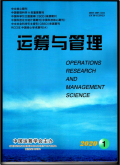运筹与管理2024,Vol.33Issue(8):93-100,8.DOI:10.12005/orms.2024.0256
共享经济下的网约车动态风险管理优化
Dynamic Risk Management Optimization of Online Car-hailing in the Sharing Economy
摘要
Abstract
As an emerging business model,the sharing economy has garnered widespread attention from all sectors of society.It emphasizes the sharing of underutilized assets in a manner that enhances efficiency and sustainability,thereby disrupting innovations across various industries,including the taxi sector.However,due to the heterogeneity of participants'social strata,the complexity of transaction motivations,and the unpredict-ability of transaction behaviors,consumers perceive risks inherent in the transaction process,which hinders the value creation of the sharing economy.Consequently,a pressing research question arises regarding how govern-ments and enterprises can effectively collaborate to address risks in the sharing economy to enhance the quality and quantity of transactions,thereby ensuring the robust development of the industry. Taking online car-hailing as an example,this paper focuses on two types of perceived risks:safety risk and service risk.Considering the occurrence of emergencies in online car-hailing and the effect of reference service quality among consumers,a dynamic game model of"government+platform"risk management is constructed to precisely describe the decision-making process between the government and platform enterprises during the opera-tion of online car-hailing.This paper represents the safety risk in online car-hailing through the occurrence of random crisis events.Service risk refers to the disparity between consumers'expected service and actual experi-ence,which leads to the possibility of consumers perceiving poor service quality and regret.The effect of refer-ence service quality is used as a metric to measure service risk.From a dynamic perspective,this paper employs differential game theory to derive the optimal venture investment strategies and performance of both parties under scenarios of government-enterprise cooperation,non-cooperation,and government cost-sharing contracts.It quantitatively analyzes the optimization of risk management in the sharing economy. The research findings of this paper indicate the following:(1)Collaborative risk management between the government and platform enterprises can maximize system performance.Government cost-sharing contracts can not only effectively reduce safety risks in online car-hailing but also achieve Pareto improvements in the benefits of both parties.However,increases in risk rates,depreciation rates,and the effect of reference service quality can,to a certain extent,weaken the improvement effect of government cost-sharing contracts.(2)Considering the potential risks inherent in the actual operation of online car-hailing,it is beneficial for the government and platform enterprises to make the most economically efficient venture investment decisions by making planned adjustments based on specific crisis scenarios.Increasing investment in risk management for online car-hailing,when risk rates and depreciation rates are low,can have a positive feedback effect on venture investment construction,fostering a virtuous cycle.In contrast,when predicted risk rates or depreciation rates are high,managers should prioritize reducing investment to offset potential future profit losses.Additionally,compared to rebuilding the reputation of online car-hailing platforms after a crisis,managers should prioritize risk prevention before a crisis occurs.(3)The effect of reference service quality can dampen the enthusiasm of governments and enterprises for investing in safety-related ventures but incentivize enterprises to improve the service quality of online car-hailing.This,to a certain extent,can mitigate the negative impact of crises on system performance.This research enriches and enhances our understanding of risks and their management optimization in online car-hailing within the sharing economy. The conclusions drawn provide meaningful insights for promoting the sustainable development of online car-hailing and can be extended to other similar sharing economy models,such as homestays in tourism.Further-more,the findings offer relevant ideas for governments to design and implement new policies and help establish sustainable transportation systems.关键词
共享经济/网约车/随机突发事件/成本分担/参考服务质量效应Key words
sharing economy/online car-hailing/stochastic crisis/cost sharing/reference service quality effect分类
管理科学引用本文复制引用
李娜,马德青,胡劲松..共享经济下的网约车动态风险管理优化[J].运筹与管理,2024,33(8):93-100,8.基金项目
国家自然科学基金资助项目(71771129) (71771129)

